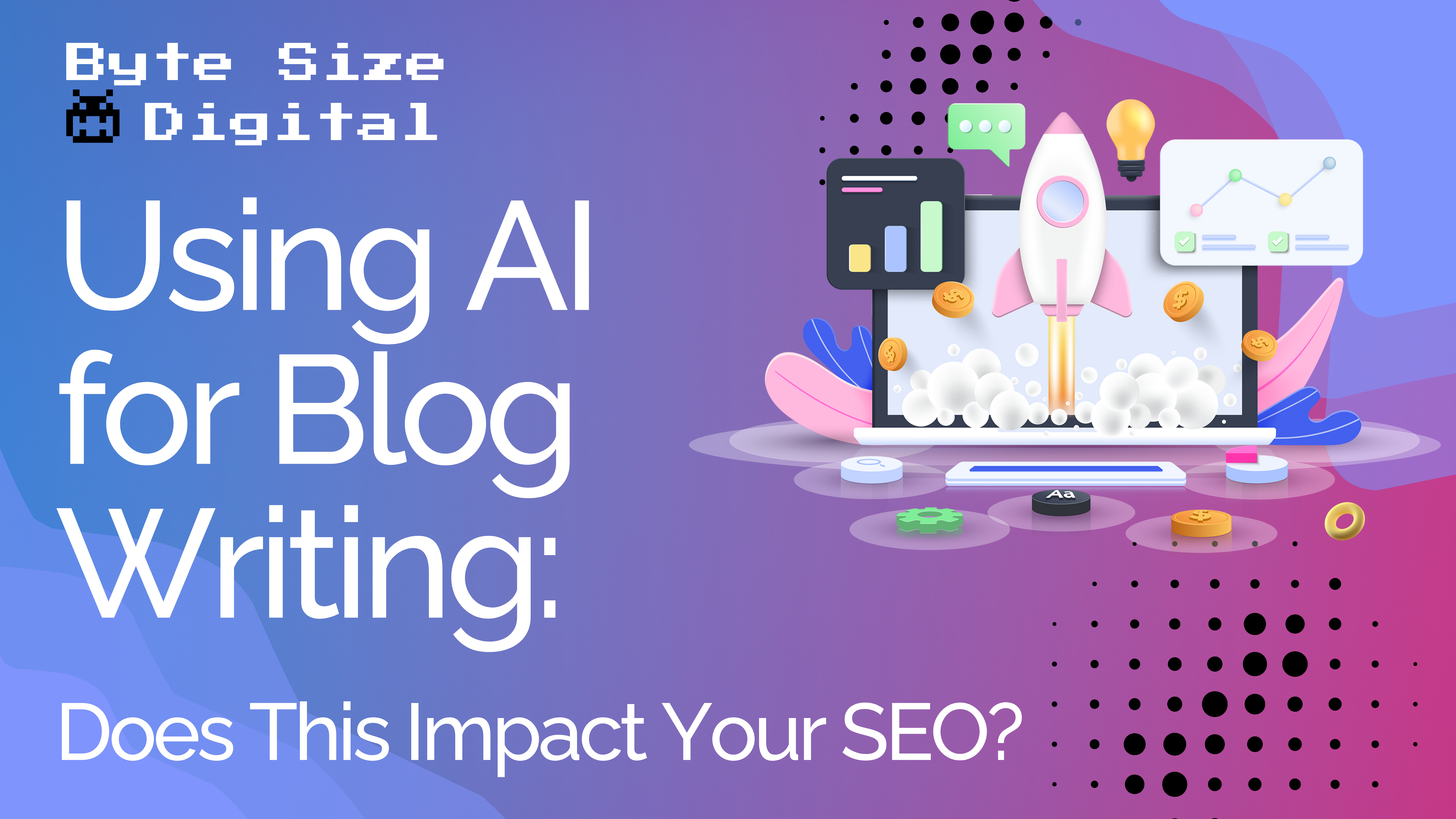In today’s digital age, the attraction of incorporating artificial intelligence (AI) into your daily work practices is undeniable. With platforms such as Chat GPT, Grammarly, and Trello right at your fingertips the workforce landscape is changing. These programs have the capabilities to streamline tasks, generate content, and provide valuable insights in seconds. Which in many cases is a dream come true. However, while AI-powered tools offer convenience and efficiency, there’s one area where its potential might be deceiving: blog writing for SEO. Does using AI generated content hurt your SEO ranking? Does Google care if your blog was written by AI? In this article, we’ll answer these questions and explore why relying solely on AI-generated content can be detrimental to your SEO efforts and overall content quality.
Why Blogs are Important
Blogging is a great way to boost your SEO. Blogs can also help establish credibility and build relationships with new and existing customers. By providing valuable content and answers to common industry questions, businesses can attract and retain customers while positioning themselves as thought leaders and experts in their field. Adding new content to your website that search engines, like the almighty Google, finds valuable is one of the best ways to increase your website’s visibility. For more on the importance of blogs in marketing, check out our full blog on this topic.
The Temptation of AI-Powered Blog Writing
AI-generated content holds the allure of efficiency, speed, and apparent seamlessness. These AI tools can turn out blogs at a pace that human writers can’t match. They claim to seamlessly integrate keywords, adhere to SEO guidelines, and produce content that, at a glance, seems tailor-made for search engines. Sounds like a dream come true, right? Well, right-ish.
Does Google Care if AI Write Your Blogs?
The short answer is not technically, but be careful. Google’s algorithms can detect AI- generated content. By noticing key points in text structure, grammar, and syntax these algorithms can detect patterns that are indicative of AI content. Which on the surface doesn’t sound like a problem. In early 2023 Google changed its stance on AI. Stating that its ranking systems look for original, high-quality content that demonstrates qualities of what they call E-E-A-T: expertise, experience, authoritativeness, and trustworthiness, regardless of whether humans or machines generate it. However prevailing thought is that it will prioritize its own AI over any others. The key points here are original, experience, and high quality. AI-generated content often fails to grasp the nuances of specific industries, leading to generic articles that don’t stand out from the crowd. AI is not speaking from experience. The thought behind the content is not original.
The SEO Paradox: Quality vs. Quantity
One of the cornerstones of effective SEO is high-quality, engaging content. Search engines prioritize content that offers value to readers, answers questions, and aligns with their search intent. AI-generated content might generate a high volume of articles, but it struggles to capture the human touch that resonates with readers. Search engines can detect content that lacks authenticity, resulting in lower rankings. A blog might be peppered with relevant keywords, but if it doesn’t offer real value, users will quickly bounce from the page, signaling to search engines that the content isn’t meeting their needs. It is also important to remember fact-check information provided by AI, just as you would with any other source of information. While AI models are designed to provide accurate and reliable information, errors or inaccuracies can still and have still occurred.
Keyword Stuffing and Unnatural Language
AI-generated content can easily fall into the trap of keyword stuffing. This outdated tactic involves excessively using target keywords in an attempt to rank higher in search results. However, search engines are wise to this approach and penalize websites that engage in such practices. Additionally, AI-generated content might produce text that reads awkwardly and lacks the natural flow of human language. Such content can harm user experience, leading to lower engagement metrics and potentially signaling to search engines that the content isn’t user-friendly.
Missed Opportunities for Creativity
Blogging isn’t just about producing informative content—it’s about sparking connections, sharing experiences, and building a community. AI lacks the creativity to tell compelling stories, offer unique perspectives, or inject personality into writing. These elements are crucial for building a brand and connecting with readers on a deeper level.
The Duplicate Content Dilemma
AI-generated content often draws from existing sources to generate new articles. Meaning that the content you are providing is not original. Remember this is one factor Google is looking for. Search engines may not penalize your website for publishing duplicate content, but it will not push your site out as an authority either, resulting in lower rankings.
How to use AI for Blog Writing
Balance is key. Our recommendation would be to use AI in the following ways: Ask AI for blog topics or popular questions that are relevant to your field. Then use personal experience and industry knowledge to write an original high quality blog. The topic that AI is providing may not be original, but your content will be. This combines AI’s ability to pick up on key words and concepts you may not have thought of with your expertise. Ask AI to write you an outline on the blog topic of your choosing. This will provide you with a solid guide for your blog, but leave the room for your own voice, experience, and creativity. While AI certainly has its place in content creation, relying solely on it for writing blogs can be counterproductive. Effective content creation requires a blend of creativity, expertise, and a genuine understanding of the target audience’s needs. To succeed in the realm of SEO-driven blogging, it’s essential to invest in human expertise. Skilled writers can produce content that not only satisfies search engine algorithms but also resonates with readers, fostering engagement and building your brand’s authority in the process. By finding the right balance between human creativity and AI assistance, you can achieve a winning strategy that propels your website to the top of search engine results while maintaining the integrity of your content. Remember, the goal isn’t just to appease algorithms but to genuinely provide value to your audience. And in that endeavor, the human touch remains irreplaceable.


